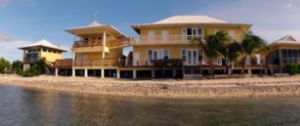CCMI lecture series aids coral reef research
(CNS): This summer, the Central Caribbean Marine Institute (CCMI) is diving into a new outreach initiative with the U.S. National Oceanic and Atmospheric Administration’s (NOAA) Atlantic Oceanographic and Meteorological Laboratory (AOML).
Starting in June and running through August, AOML researchers have been giving a series of talks on various oceanographic topics to the institute’s staff and students participating in the National Science Foundation’s (NSF) Research Experiences for Undergraduates programme at the institute’s Little Cayman Research Centre (LCRC).
Every summer, CCMI hosts undergraduate students at the LCRC as part of the NSF-funded research programme. Students work with mentors to design, implement, and present research projects within the institute’s research themes of coral reef stress, climate change, ocean acidification, and coral reef resilience and restoration.
This lecture series provides students with an opportunity to gain insight into current coral reef research programmes to help them refine their summer projects. The series also offers networking opportunities for students and staff, and fosters relationships with the AOML research community. Topics will include ocean-reef interactions, microbiology, ecosystem-based management, and impacts to coral health. CCMI is funding the lectures.
In addition to providing lectures, AOML coral researchers are teaming up with CCMI scientists and NOAA’s National Centers for Environmental Information to examine variations of temperature and light at the local scale over the coral reefs surrounding Little Cayman.
Collecting and analysing this important data will enhance NOAA’s coral reef ecological forecasting tools and help evaluate the adequacy of regional-scale observations in monitoring for environmental threats to the reefs. This data will also assist other projects being carried out by various research groups on the Little Cayman reefs including those focused on constructing a global climate record using coral core samples, connecting water conditions to algal growth on the reefs, and investigating why some reefs are more resilient than others over small distances.
Located on Little Cayman, the LCRC is next to some of the most biologically diverse reef systems on earth. These reefs are particularly important to coral reef scientists as they are largely unaffected by local human and development impacts.
AOML scientists have previously collaborated with the Little Cayman-based research centre. NOAA’s Coral Reef Early Warning System (CREWS) established a monitoring station on the reef adjacent to the research centre in 2009. CREWS stations are scattered across the Caribbean and contain a suite of oceanographic and atmospheric sensors that monitor environmental conditions in an effort to provide scientists with early warning of climate-related events such as coral bleaching.
Below is a schedule of the upcoming AOML lectures:
30 July – 3 August
– “Molecular Microbiology in the Marine Environment: Biocomplexity, Microbial Source Tracking, and Metagenomic Observations”
– “Interactions Between Ocean Health and Human Health”
– “Coral Research at NOAA/AOML’s Ocean Chemistry and Ecosystems Division”
– “Supporting NOAA Coral Reef Research: the Cooperative Institute for Marine and Atmospheric Studies”
3 August – 7 August
– “Spatial Gradients in Carbonate Chemistry and Their Influence on Ecosystem Processes”
– “Science to Inform Ecosystem-Based Management”
– “Sloshing and Mixing Between Reef and Ocean: Physical Processes Impacting Connectivity and Thermal and Biogeochemical Variability for Cayman Corals”
For more information, visit the CCMI website or email Kristi Foster
Category: Uncategorised


